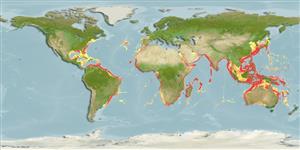Environment: milieu / climate zone / depth range / distribution range
Ekologi
laut; payau berasosiasi dengan karang; oceanodromus (Ref. 51243); kisaran kedalaman 0 - 1200 m (Ref. 9739). Subtropical; 17°C - 32°C (Ref. 12459); 47°N - 37°S, 98°W - 166°E (Ref. 12459)
Worldwide in tropical and subtropical waters, but absent in the eastern Pacific (Ref. 9739, 33390) and the Pacific Plate, except marginally (Ref. 10948). Western Atlantic: Canada (Ref. 5951) to Bermuda and Massachusetts, USA to Argentina (Ref. 7251), including the Gulf of Mexico (Ref. 9626) and entire Caribbean (Ref. 26938). Eastern Atlantic: Morocco to South Africa. Indo-West Pacific: East Africa (Ref. 2871, 5213, 6644, 30573) and Hokkaido, Japan to Australia.
Length at first maturity / Size / Weight / umur
Maturity: Lm ?, range 43 - ? cm
Max length : 200 cm TL jantan/; (Ref. 10790); common length : 110 cm TL jantan/; (Ref. 3487); Berat maksimum terpublikasi: 68.0 kg (Ref. 7251); Umur maksimum dilaporkan: 15 Tahun (Ref. 9739)
deskripsi pendek
Kunci identifiaksi (pengenalan) | Morfologi | Morfometrik
Duri punggung (Keseluruhan (total)) : 7 - 9; duri punggung lunak (Keseluruhan (total)) : 26 - 33; Duri dubur: 2 - 3; Sirip dubur lunak: 22 - 28. This species is distinguished by the following characters: head broad and depressed; first dorsal fin usually with VIII short but strong isolated spines, not connected by a membrane; caudal fin lunate to emarginate in adults, upper lobe longer than lower, rounded in young with prolonged central rays. Colour of back and sides dark brown, with 2 sharply defined narrow silvery bands, belly yellowish (Ref. 10948, 90102).
Adults occur in a variety of habitats, over mud, sand and gravel bottoms; over coral reefs, off rocky shores (Ref. 10948) and in mangrove sloughs; inshore around pilings and buoys, and offshore around drifting and stationary objects; occasionally in estuaries (Ref. 9739). Form small groups and may pursue small pelagic inshore (Ref. 48635). Feed on crabs, fishes, and squids (Ref. 5213, 10948, 13442). Form spawning aggregations during the warm months in the western Atlantic; eggs and larvae planktonic (Ref. 12459). Caught in small quantities due to its solitary behavior (Ref. 9626). Caught mainly with handlines, and by trolling pelagically offshore over the continental shelf (Ref. 10948). Good food fish; marketed fresh (Ref. 5284), smoked, and frozen (Ref. 9987). Also caught for sport (Ref. 26938).
Form spawning aggregations during the warm months in the western Atlantic; eggs and larvae planktonic (Ref. 12459).
Shaffer, R.V. and E.L. Nakamura, 1989. Synopsis of biological data on the cobia Rachycentron canadum (Pisces: Rachycentridae). NOAA Tech. Rep. NMFS 82, FAO Fisheries Synopsis 153. (Ref. 9739)
Status IUCN Red List (Ref. 130435: Version 2024-1)
ancaman kepada manusia
Harmless
penggunaan manusia
Perikanan: nilai komersial kecil; Budidaya air: komersial; Ikan buruan: ya
Alat, peralatan
laporan khas
muat turun XML
Sumber internet
Estimates based on models
Preferred temperature (Ref.
123201): 8.1 - 19.8, mean 12.9 °C (based on 1010 cells).
Phylogenetic diversity index (Ref.
82804): PD
50 = 1.5000 [Uniqueness, from 0.5 = low to 2.0 = high].
Bayesian length-weight: a=0.00490 (0.00359 - 0.00668), b=3.11 (3.02 - 3.20), in cm total length, based on LWR estimates for this species (Ref.
93245).
Trophic level (Ref.
69278): 4.0 ±0.0 se; based on diet studies.
Generation time: 3.9 (2.2 - 4.6) years. Estimated as median ln(3)/K based on 16
growth studies.
Daya lenting (Ref.
120179): sedang, Waktu penggandaan populasi minimum 1.4 - 4.4 tahun (K=0.09-0.22; tm=2-3; tmax=15).
Prior r = 0.58, 95% CL = 0.38 - 0.87, Based on 2 full stock assessments.
Fishing Vulnerability (Ref.
59153): Moderate vulnerability (42 of 100).
Climate Vulnerability (Ref.
125649): High vulnerability (62 of 100).
Nutrients (Ref.
124155): Calcium = 13.7 [6.0, 25.4] mg/100g; Iron = 0.49 [0.24, 0.88] mg/100g; Protein = 20 [19, 21] %; Omega3 = 0.167 [0.084, 0.369] g/100g; Selenium = 47.6 [20.3, 101.5] μg/100g; VitaminA = 18 [5, 73] μg/100g; Zinc = 0.435 [0.271, 0.692] mg/100g (wet weight); based on
nutrient studies.
